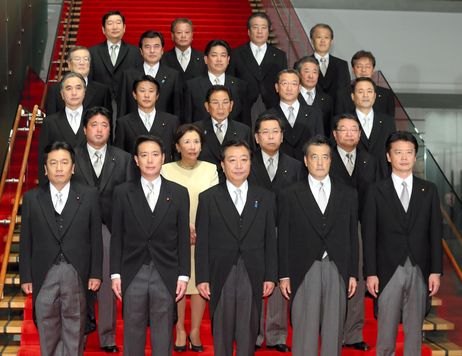Japan's Auto Industry Unhappy With Its Government

On Monday, Japan’s prime minister Yoshihiko Noda presented a new and improved cabinet, tailcoats and all. Apparently, that cabinet has few friends in Japan’s auto industry.
Akio Toyoda, who took over the rotating chairmanship of the Japan Automobile Manufacturers Association last May, sent a surprisingly strongly worded address to his new leaders. Speaking on behalf of all JAMA members, Toyoda said:
“The automobile industry faces unprecedented sustained yen appreciation, a high corporate tax rate, a slowdown in trade liberalization, strict domestic labor regulations, stringent goals for reducing carbon dioxide emissions and a restricted electric power supply. The combined result is an extremely severe business environment for our sector.”
“Anxiety has also arisen over the territorial dispute with China, the impact of which is being felt by the Japanese automobile industry and the national economy even as it threatens livelihoods, impedes cultural exchanges and fuels other disturbing trends.”
Indeed, the hamfisted handling of the dispute over a few rocks in the East China Sea probably already triggered a third disaster for Japan’s auto industry, this time in China, as if the tsunami at home and the floods in Thailand weren’t bad enough.

Bertel Schmitt comes back to journalism after taking a 35 year break in advertising and marketing. He ran and owned advertising agencies in Duesseldorf, Germany, and New York City. Volkswagen A.G. was Bertel's most important corporate account. Schmitt's advertising and marketing career touched many corners of the industry with a special focus on automotive products and services. Since 2004, he lives in Japan and China with his wife <a href="http://www.tomokoandbertel.com"> Tomoko </a>. Bertel Schmitt is a founding board member of the <a href="http://www.offshoresuperseries.com"> Offshore Super Series </a>, an American offshore powerboat racing organization. He is co-owner of the racing team Typhoon.
More by Bertel Schmitt


































Comments
Join the conversation
It's very easy to blame one administration for an issue when there is a collective culpability that everyone would rather not explore, especially when a variety of people involved have zero desire to behave responsibly or rationally about it.
Normally you would be right. But in this instance, Toyoda's missive is spot on. The japanese government is directly responsible for its monetary policy and its foreign policy. Even a giant corporation like Toyota is helpless to change these things.
First, monetary policy in Japan, much like the US, is not directly controlled by politicians. Its controlled by the BOJ. Checks and balances are put in place so that politicians can't print money to appease voters. For their part, Noda, and DPJ have long pressured the BOJ to basically print more money and weaken the yen. Keep in mind, the Japanese invented QE. And they went through several stages of it starting in 2000. It helped profits of some Japanese multinationals but it didn't help Japan get out of its decade long slump. Secondly, the island spat. This is something long that is a long-time coming. It flared up in 2010 with the rare-earth export ban. China has been having head-on conflicts with countries in the South China Seas, and they have been butting heads with the US there as well. This island spat is just as much a fight between an assertive China versus an America this is refocusing their power into Asia.
On the subject of the strong yen: Recently, there have been new views on why Japan keeps the yen so strong instead of devaluing their currency like the Chinese or the S. Koreans (which have had their domestic brands thrive as a result). This is very different from Japan five years ago. Japan actually wants their currency strong (to a point). Japan is starting to see that a strong currency can help them. A strong yen allows Japanese companies to fund development and expansion overseas (particularly in the booming South East Asia)cheaply, this as investors pile into the yen as a reserve currency to escape from competitive devaluation that is happening elsewhere. This will allow foreign investors to actually fund Japan Inc expansion into the emerging world. There is also some futility in competing with the US and China in printing money. China, for instance, last week inject 365 billion yuan ($57.9 billion) to keep up with America's QE3 (China's largest in a single week). The yuan STILL strengthened. Peter Pham on the strong yen: "expect the Bank of Japan to continue to try and position the yen as an alternative regional reserve currency as other Asian nations like Thailand, Malaysia and Indonesia try to lessen their reliance on the U.S. economy. By keeping the yen strong versus the euro and the dollar, Japan can attract capital from overseas and use it to deploy it around Asia. There should be enough money sloshing around the region so that Asian nations can continue their trade with the West at current levels while also focusing more on regional growth." http://money.cnn.com/2012/09/26/investing/qe3-china-asia/index.html